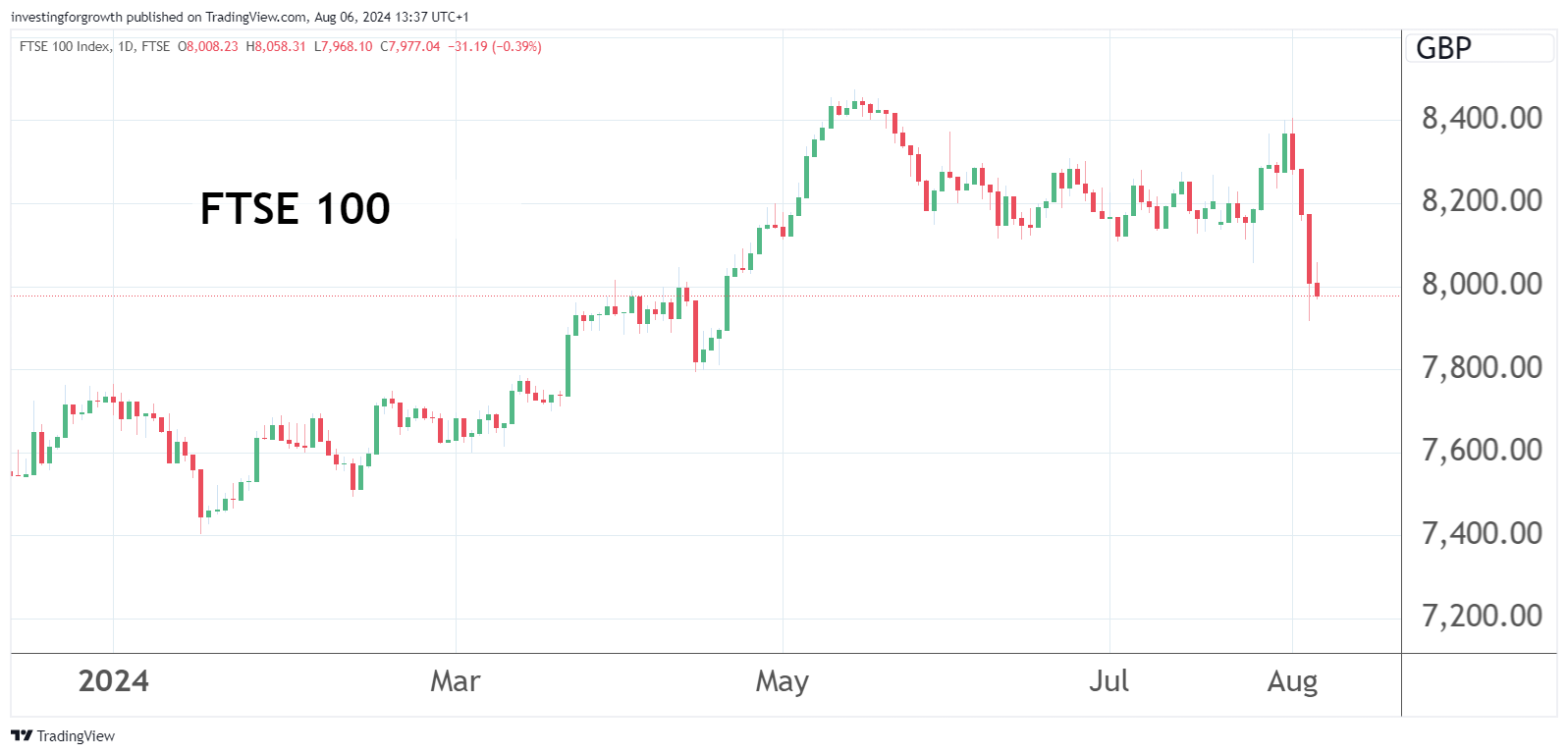Biggest FTSE 100 losers in awful August 2024
After a terrible start to the month as markets react badly to latest US data, City writer Graeme Evans looks at the casualties and stocks attempting a recovery.
6th August 2024 13:59
by Graeme Evans from interactive investor

Glencore (LSE:GLEN), Barclays (LSE:BARC) and NatWest Group (LSE:NWG) are among the heavyweight blue-chip stocks trading 8% or more lower after Monday’s market mayhem extended their dismal start to August.
These and other cheaper stocks today failed to do much to revive the FTSE 100 index, despite Wall Street’s Vix fear index last night retreating from earlier pandemic-era levels.
- Invest with ii: Top UK Shares | Share Tips & Ideas | What is a Managed ISA?
Tokyo’s Nikkei 225 also rebounded after Monday’s 12% slide, a sell-off triggered by a rapid unwinding of yen carry trades (borrowing in a currency with low interest rates and reinvesting the money in assets with higher yields) and mixed earnings from the large-cap tech sector.
There was no such recovery for the FTSE 100 index after yesterday’s 2% reverse, with the top-flight benchmark barely changed by midday and about 4% lower in August so far.

The retreat back to levels seen in April has taken place even though the month started positively on Thursday following forecast-beating or robust updates by Rolls-Royce Holdings (LSE:RR.), Barclays, Next (LSE:NXT), Shell (LSE:SHEL), Smith & Nephew (LSE:SN.) and London Stock Exchange Group (LSE:LSEG) among others.
Rolls touched 500p in the moments after it announced plans to declare a dividend with 2024 results, only to find itself back at 432p by yesterday afternoon.
- Rolls-Royce shares break record on results and dividend joy
- Market snapshot: volatility persists for now
Its shares posted one of the best performances in today’s session after a rebound of 18p to 461.7p, while GKN Aerospace owner Melrose Industries (LSE:MRO) recovered 25p to 476.9p after JP Morgan highlighted a 650p target price.
Melrose shares were the worst performing in the first four days of August, the fall of almost 20% coming after a downgrade to 2025 revenues guidance due to supply chain pressures.
The scale of selling highlighted the current market jitters over the economic outlook, given that Melrose’s half-year results also beat the company’s profit expectations at £247 million and it upgraded margin guidance for next year.
The aerospace-focused pair stood out in a session when sentiment in the banking sector at least steadied after Thursday’s Bank of England interest rate decision and a poor second-quarter update by Societe Generale SA (EURONEXT:GLE) sent shares sharply lower on Thursday.
NatWest started today’s session down by 11% and HSBC Holdings (LSE:HSBA) 10% cheaper, even though recent half-year figures by the UK bank beat forecasts and the Asia-focused lender announced a $3 billion buyback alongside its results.
- High-yield HSBC delivers fresh show of strength
- Sign up to our free newsletter for share, fund and trust ideas, and the latest news and analysis
- Vodafone dividend among £3bn of cash for investors in August
Mining stocks have been heavily sold so far in August after fears of a US recession added to the ongoing jitters about the health of China’s economy. The biggest casualties have been Antofagasta (LSE:ANTO) and Glencore after falls of about 8.5%.
The latter is due to present half-year results tomorrow, when investors will be looking to see if the commodities giant still intends to separate its recently enlarged coal business. Retaining the operations has the potential to unlock the return of top-up of shareholder distributions.
Name | Price | Sector | August so far (%) | Today's move (%) | 1-month change (%) | 2024 so far (%) |
480.8p | Industrial Goods and Services | -18.3 | 6.4 | -16.8 | -15.3 | |
337.8p | Financial Services | -14.0 | 0.7 | -11.5 | -21.4 | |
321.7p | Banks | -12.6 | -0.2 | -1.0 | 46.6 | |
207.375p | Banks | -11.3 | 0.6 | -6.0 | 34.9 | |
507.1p | Travel and Leisure | -11.2 | -2.4 | -20.7 | -49.0 | |
688.4p | Consumer Products and Services | -11.2 | -3.6 | -22.5 | -51.4 | |
625.55p | Banks | -11.1 | 0.0 | -7.1 | -1.6 | |
1965p | Financial Services | -10.5 | 2.2 | -12.4 | 16.9 | |
690.8p | Banks | -10.0 | 0.6 | -4.5 | 3.6 | |
3469p | Financial Services | -9.9 | -0.4 | -16.3 | -3.2 |
Other struggling stocks in the FTSE 100 index have included Scottish Mortgage Ord (LSE:SMT) Investment Trust, which has fallen 10% in August amid selling of portfolio companies including NVIDIA Corp (NASDAQ:NVDA) and Amazon.com Inc (NASDAQ:AMZN). The chipmaker, for example, fell 6% in yesterday’s Wall Street session.
Overall, the FTSE 100 decline of about 4% compares favourably with reverses elsewhere that have ranged between 5% for the Cac40 in Paris and the Dow Jones Industrial Average through to 8% for the Nasdaq Composite.
UBS Global Wealth Management said that while market moves in recent days have been dramatic, it is important to keep them in the context of recent exceptional performance for global equities. It notes the S&P 500 is down 8.5% from its mid-July all-time high but still up 10% for the year.
It said: “The narrative driving global equity markets has pivoted dramatically in recent weeks.
“Optimism about artificial intelligence, robust growth, and a potential ‘roaring 20s’ for economies and markets has given way to fears of a US recession, concerns about AI monetisation and rising risk of conflict in the Middle East.
“While US economic data has been softer than expected for several months, Friday’s employment data appears to have triggered a mood change in the market.”
- Stockwatch: third time lucky for this takeover target?
- Is this new type of ISA the one for you?
- Prospects for IHT under new Labour government
Despite the weaker payroll data, UBS believes recession risks remain low and that its base case is still for a soft landing for the US economy with growth bottoming slightly below the 2% trend.
US bank Jefferies agrees and does not think the Federal Reserve will cut rates between scheduled meetings or opt to deliver a 50-basis points reduction in September.
It said: “We do not think that the US economy (or Europe) is headed for a hard landing.
“The aggressive market reaction over the last few sessions was due to a combination of heavy positioning, unwind of carry trades, summer illiquidity and geopolitical concerns which amplified the shift in market perception of the US economy.”
Deutsche Bank strategist Jim Reid said the savageness of the intraday moves in the Vix index showed how much short-dated options trading has exploded over recent years.
At one point yesterday, the Vix was trading at 65.73 for a rise of 42.34 points or 181% from Friday’s close. Reid said the largest full day move since the index was first calculated in 1990 was the 21.57-point increase in March 2020 around the initial Covid wave.
Last night the Vix closed up 15.18 points at 38.57, with the percentage increase of 65% higher than any during the global financial crisis (GFC).
Reid said: “What a once-in-a-lifetime GFC period couldn’t do, an illiquid August day in 2024, with one bad (weather-related) payrolls print for fuel, did with some ease for a period of time yesterday. What would have happened if we’d have seen a negative payroll print that wasn’t weather related?”
These articles are provided for information purposes only. Occasionally, an opinion about whether to buy or sell a specific investment may be provided by third parties. The content is not intended to be a personal recommendation to buy or sell any financial instrument or product, or to adopt any investment strategy as it is not provided based on an assessment of your investing knowledge and experience, your financial situation or your investment objectives. The value of your investments, and the income derived from them, may go down as well as up. You may not get back all the money that you invest. The investments referred to in this article may not be suitable for all investors, and if in doubt, an investor should seek advice from a qualified investment adviser.
Full performance can be found on the company or index summary page on the interactive investor website. Simply click on the company's or index name highlighted in the article.